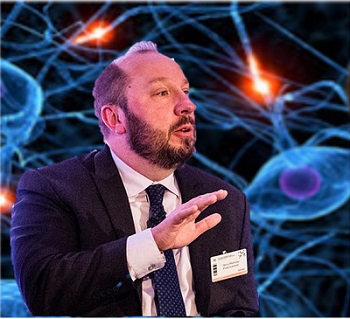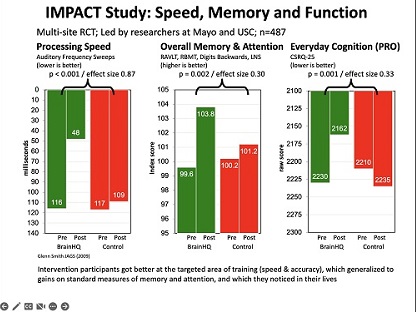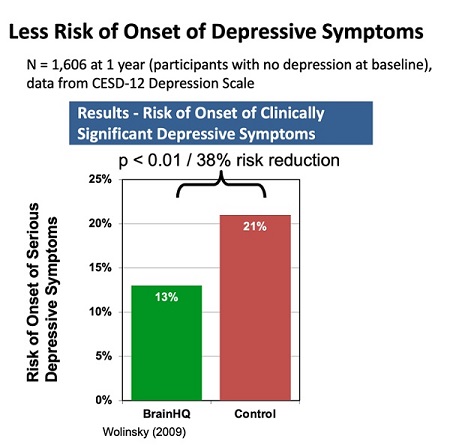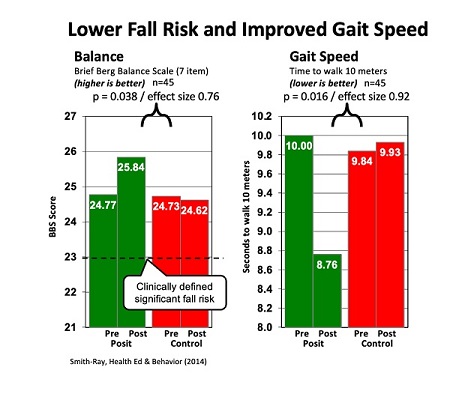Positive Health Online
Your Country

What Neuroscience Teaches Us About Nurturing You and Your Brain as You Age
by Dr Henry Mahncke(more info)
listed in neurological and neurodegenerative, originally published in issue 286 - May 2023
I’ve spent the last three decades as a brain scientist on the front lines of revolutionary work in understanding what happens to the brain as an organ as it faces ageing and other vicissitudes of life, and what we can do to counteract those processes and improve brain performance. The good news is that the brain is highly capable of positive change at any age and in nearly any condition.
In this column, I aim to give you some background on the development of the science and how you can take advantage of breakthroughs in neuroscience to improve brain performance and daily life as you age.

Author and Researcher Dr Henry Mahncke
The Brain Plasticity Revolution
When I began my studies as a graduate student, most scientists believed that the brain was like a computer chip – with the wiring laid down early in life, and hard-wired by adulthood. After that, it was all downhill, as connections between brain cells were gradually lost and brain cells themselves died slowly but surely. This led many scientists to believe that cognitive decline in ageing – and perhaps even dementia – was an inevitable feature of the brain simply wearing out over time. In short, they believed that brains afflicted with neurological and psychiatric disorders due to bad genes or bad luck were stuck that way – because they were wired the way they were wired and there was no changing that in adults.
This was the conventional wisdom for decades – and it was completely wrong.
Thanks to the work of my PhD advisor, Dr Michael Merzenich at UCSF, and his hundreds of students and collaborators from around the world, neuroscience textbooks now teach that the brain is capable of chemical, physical, and functional change – what scientists call “plasticity” – at any age (and not just in childhood).
The hints of adult brain plasticity had been there all along. After all, people recover from brain injuries and strokes all the time, and it was well understood that this recovery occurred by plasticity-based changes in the brain. But it was thought this was an unusual situation specific to injury – and it wasn’t appreciated that brain plasticity was in fact a general way the brain worked in just about every situation and at every age.
Dr Merzenich was one of the first to appreciate that the adult brain could reorganize itself as a result of his work inventing the cochlear implant – a medical device that restores hearing to people with deadness – with a team of researchers at UCSF. Their first implant was quite primitive – and the researchers thought it would be a breakthrough if the first patient could hear a sound at all. But they found that patient could, after a few weeks, hear complex sounds and even understand speech. That astonishing result told Dr. Merzenich that the brain must have rewired itself to adapt to the primitive implant – and that rewiring had improved how the brain processed information.
Rewiring Brains For Better Brain Health
This prompted an explosion of brain science research. Key experiments showed that brains changed at the molecular, cellular, and systems levels in response to learning, experience, and training. And in fact, as behavior changed through learning, brain wiring changed in ways that precisely mirrored – and explained – the learning, and the resulting perceptual and cognitive abilities of the brain.
This culminated in experiments showing that by training rats in progressively challenging tasks, we could improve the speed and accuracy of their brain information processing and their cognitive abilities. But that wasn’t the most exciting part, since, at that point, improving rat brain performance had been demonstrated repeatedly. What most excited researchers was that this learning and brain change led to systematic changes in the health of the brain as a biological organ. Virtually every measure of brain health improved – from the insulation that wraps neural wiring to the numbers of specific neural subtypes. And that meant we could take a very old rat and train them to have a brain that looked like, and performed like, a young rat. Which meant that the right kind of brain training could keep the brain healthy – just like the right kind of physical training can keep the body healthy.
This research was great news for rats – but what about people?
What Happens in an Ageing Brain?
Why do cognitive abilities like memory, attention, and speed typically decline in an ageing brain? Well, we now know that the brain starts slowing in its processing speed in your late 20s. This slowing is measured in milliseconds (thousandths of a second), so at first it is not very noticeable. By the time, an average person is in their 40s, they may start to notice asking people to repeat themselves or a bit of forgetfulness, which becomes more pronounced in almost everyone with the passage of decades.
Because of this slowing, the brain becomes less accurate in the processing of sensory and other information. Brain scientists refer to this as the brain becoming “noisy.” You can think of it as being a bit like a radio signal that comes in and fades out and has static at times.
Most of the information you receive comes in through your eyes and ears (though all of your senses are involved). If information comes in faster than you can process it, or comes in with a bit of noise added to it, it is hard to accurately capture that information, to manipulate it, to store it, and to retrieve it. That in a nutshell, is why attention, memory and decision-making cognitive scores tend to decline with age.
There one more important factor we should discuss. Your brain releases brain chemicals (called neuromodulators) to help you with your brain wiring. When you feel rewarded by a good result, your brain pumps a bit of dopamine. Think of that as the brain’s way of saying, “That was a good one, remember that.” Similarly, when you encounter something new, your brain pumps a bit of norepinephrine. Think of that as the brain’s way of saying, “Hey, that’s something new, pay attention to that.” And, when you are working at paying attention, your brain pumps a bit of acetylcholine. Think of that as the brain’s way of saying, “That’s important, attend to that.”
All of these (and other) neuromodulators help the brain be more plastic and more capable of learning and change. They also happen to be the same sort of chemicals that make things memorable and that improve your mood. As you age, we know that for pretty much all of us, the production of these chemicals tends to down-regulate, rather severely in the elderly.
Plasticity-based Brain Training
After getting my doctorate, I went to work for a large global consulting firm, and specialized on helping large companies with developing medical devices, and for a bit of variety, in launching a consulting practice in the nascent field of video games. As I established a family and wanted more time at home, I left consulting for a job as a special attaché on technology to the British government. One rainy day 20 years ago, as I walked home in San Francisco from the British consulate, I got a call from my PhD adviser, Mike Merzenich. He said “Henry we’ve helped a lot of rats build better brains and it’s time we help people do that too.”
I was recruited to lead a global scientific team in taking the technology developed for ageing rats out of the lab and into the world to help humans. We did so by developing computerized brain exercises that were intensive, repetitive, and progressively challenging. They were also attentionally demanding (to pump acetylcholine), filled with novelty (to pump noradrenaline) laden with rewards (to pump dopamine). Best of all, with the development of personal computers (and smart phones and tablets) and smart algorithms and artificial intelligence, they were much more capable than any grad student overseeing rat experiences of very precisely monitoring your successes and failures and making micro-adjustments to challenge you super-efficiently in just the right areas to be challenged next.

Brain speed, attention, and memory – Results from the IMPACT study led by the Mayo Clinic and USC
Over a period of two decades, we have replicated and expanded on what we learned from rats in humans. The new brain exercises were designed to improve information processing and improve neuromodulatory systems in people – with the goal of improving brain health, just as we had seen in rats, and improving cognitive performance and real-world function in people.
To show that it worked, we worked with a global network of hundreds of university-based scientists, putting these exercises into their hands for independent clinical testing. That group has published more than 200 peer-reviewed studies on improving the health and performance of the brain (with more than 100 in healthy older adults and in population with diseases associated with ageing).

Mood - Results from a Study on the Onset of Depressive Symptoms
These studies have shown benefits across a wide variety of aspects of brain health, including:
- Speed – more than 100% faster speed, in both the auditory and visual systems;
- Attention – sharper attention, including better peripheral vision and reduced distractibility;
- Memory - Memory gains equal to the average 10-year decline in older adults;
- Mood - 38% lower risk of the onset of depressive symptoms, and a 30% lower risk of the deepening of depressive symptoms;
- Health - 38% less risk of serious decline in health-related quality of life, better self-rated health, lower predicted medical expenses; and
- Independence - 36-month extension in a measure of independent living skills, 68% greater feelings of control, 48% reduction in at-fault car crashes.
In addition, there are scores of studies across a wide variety of clinical conditions (brain injuries, neurodegenerative conditions, mental illnesses) where these plasticity-based exercises have also shown gains in health and performance measures.

Fall Risk Study Results
How Apps Can Help You Improve Brain Health
Our understanding of brain health has continued to expand by leaps and bounds. While twenty years ago, most people thought of brain health decline and cognitive decline as inevitable aspects of ageing, we now recognize the crucial roles of brain training, physical exercise, nutrition, sleep, stress management, and social contact in maintaining or even improving brain health as we age. And in our modern, digital, connected age, there are apps that can help us with each of these aspects of brain health:
- Brain training: Our team turned this basic science of brain plasticity into engaging, effective brain training exercises with proven benefits in the BrainHQ app.
- New learning: Focus on activities that are attentionally demanding, progressively challenging, and involve processing speed. Work on a new language with Babbel, practice a music instrument with Fender Play, or learn to sing with Vanido.
- Physical exercise: Exercise can release growth factors key for brain health. Track your exercise with the built in Apple Fitness or Google Fitness
- Nutrition: A healthy diet can improve heart health, which helps brain health. Try recipes from the MIND diet, with a helpful app.
- Overall Ageing Advice: Bestselling author Dr Michael Roizen has published a book called The Great Age Reboot and a similarly-named app that gives you daily advice on ageing
- Sleep: You brain works while you sleep to consolidate new learning. Track your sleep with an Apple Watch or an Oura Ring, or work on sleeping better with io.
- Stress: Try a mindfulness/meditation app like Headspace or Calm.
- Social contact: Scrolling on social media apps might not be good for brain health, but staying in touch with friends and family on the phone is good, and a regular Zoom call to see people’s friendly faces is a balm for any brain.
Whatever you do, don’t let anyone tell you that you or your brain are not capable of change and improvement. Nurture your brain and enjoy your life.
Comments:
-
No Article Comments available